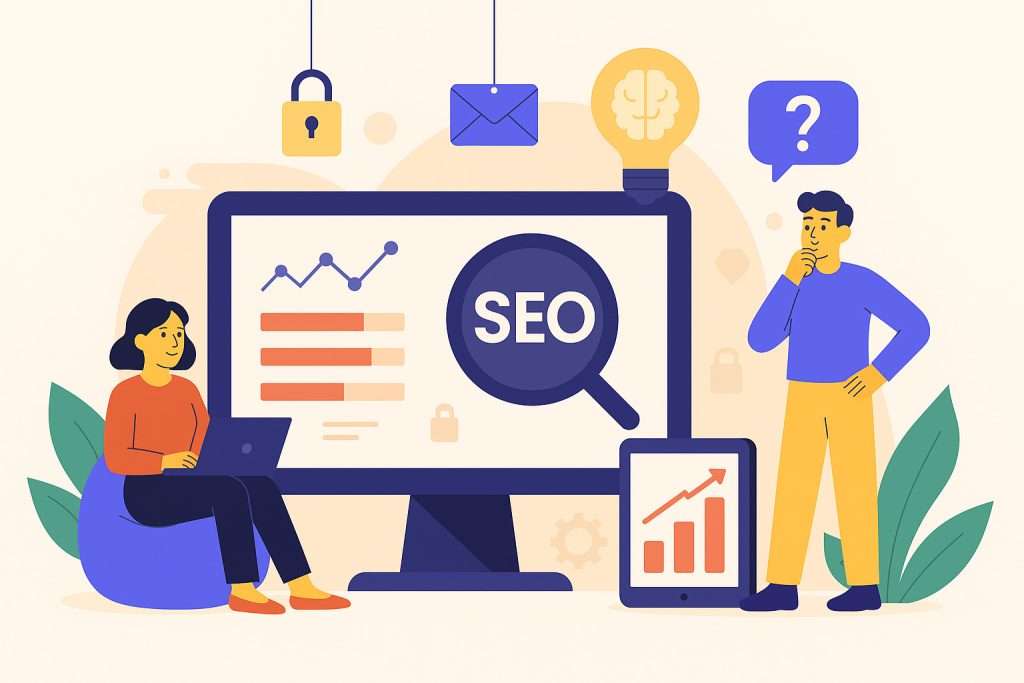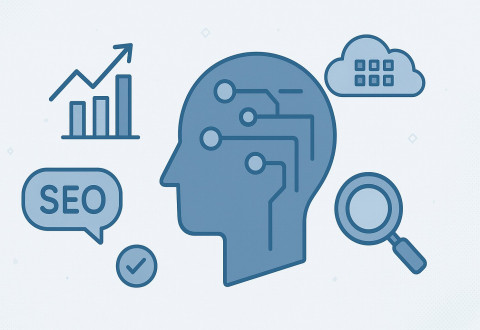Gone are the days when SEO meant stuffing keywords into content and hoping for the best. Today’s digital marketing landscape demands a sophisticated SEO strategy that I call SEO intelligence—a data-driven methodology that leverages artificial intelligence, machine learning, and advanced analytics to predict, optimize, and dominate search engine results.
Search engine algorithms now prioritize content that truly meets search intent rather than generic optimization attempts. This shift means SEO professionals must evolve from keyword optimizers to intelligent strategists who understand the complex interplay between user behavior, competitive dynamics, and search engine rankings. SEO intelligence represents this evolution, transforming reactive SEO efforts into proactive strategy development that drives sustainable SEO success.
⚠️ SEO intelligence combines AI, machine learning, and data analytics to transform traditional SEO into a predictive, automated approach
⚠️ Modern search optimization requires understanding four key pillars: SERP intelligence, competitor analysis, user behavior insights, and technical optimization
⚠️ AI tools now automate 44% of SEO tasks, with 86% of professionals integrating AI into their strategies
⚠️ Voice and visual search optimization are becoming critical components of comprehensive SEO intelligence
⚠️ Implementation success depends on systematic data collection, analysis frameworks, and continuous optimization cycles
What is SEO Intelligence? A Modern Definition
SEO intelligence is the strategic application of artificial intelligence, machine learning algorithms, and advanced data analytics to enhance search engine optimization efforts. Unlike traditional SEO approaches that rely on manual keyword research and historical best practices, SEO intelligence uses real-time data processing to predict ranking opportunities, automate SEO tasks, and deliver personalized search experiences.

AI-powered SEO tools leverage machine learning algorithms, natural language processing (NLP), predictive analytics, automated optimization systems, and conversational search analysis. These technologies process vast datasets in seconds, identifying search trends and opportunities that would take human analysts hours or days to uncover. For instance, predictive analytics can forecast which keyword variations will gain popularity based on seasonal patterns, target audience behavior shifts, and emerging market demands.
The fundamental difference between traditional SEO and modern SEO intelligence lies in approach and capability. Traditional methods rely on reactive optimization — analyzing existing content performance and making adjustments after the fact. SEO intelligence operates proactively, using predictive models to anticipate algorithm changes, user behavior shifts, and competitive moves. With 84% of SEO specialists reporting that AI influenced their SEO strategies in 2026, the transition from traditional to intelligent SEO is no longer optional — it’s essential for maintaining website’s visibility and driving organic traffic.
Traditional SEO: Manual keyword research → Static optimization → Reactive adjustments
SEO Intelligence: AI-powered analysis → Dynamic optimization → Predictive strategy
The Four Pillars of Effective SEO Intelligence
Effective SEO intelligence rests on four foundational pillars that work synergistically to create comprehensive optimization strategies. Each pillar contributes unique insights and capabilities, but their true power emerges when integrated into a cohesive framework. Understanding these pillars helps organizations build sustainable competitive advantages in search results.

SERP Intelligence: Decoding Search Engine Results
SERP intelligence involves systematic analysis of search engine results pages to understand ranking patterns, feature triggers, and user intent signals. Modern SERP analysis reveals that Google increasingly favors functional tools over informational content—for example, keyword research queries now show 90% tools versus 60% in previous years. This insight demonstrates how SEO intelligence works to reveal strategic opportunities that traditional analysis might miss.
Advanced SERP insights examine multiple data points: featured snippet opportunities, People Also Ask patterns, image pack triggers, local search pack appearances, and knowledge panel activations. Modern SEO intelligence tools like Semrush and Ahrefs now incorporate AI algorithms to identify these patterns automatically, providing valuable data that helps pages rank higher in search results. Successful SERP intelligence combines automated data collection with strategic analysis to uncover actionable insights that drive content strategy decisions and improve organic search performance.
Competitor Intelligence: Learning from Your Search Rivals
Competitive analysis in the SEO context goes beyond identifying business competitors — it focuses on discovering who actually competes for your target keywords and search visibility. AI-driven SEO tools like Surfer SEO and Clearscope now analyze top-ranking pages to provide data-backed optimization recommendations, including optimal keyword placement and content structure strategies that make competitive analysis more precise and actionable than ever before.
Effective competitor intelligence examines content strategies, backlink analysis profiles, technical SEO implementations, and user engagement patterns across web pages. Machine learning algorithms can process competitor data to identify successful content formats, optimal content lengths, semantic keyword usage, and high-quality backlinks strategies. This marketplace intelligence enables strategic decisions about content creation, resource allocation, and optimization priorities based on proven success patterns rather than assumptions, ultimately improving your site’s performance in organic search.
User Behavior Intelligence: Understanding Search Intent
User behavior intelligence analyzes how searchers interact with content to optimize for engagement, satisfaction, and conversion. Google’s algorithms increasingly use user signals to determine content quality and relevance, making behavioral optimization crucial for ranking success. This pillar examines metrics like dwell time, click-through rates, bounce rates, and user flow patterns to understand content effectiveness.
Modern user behavior analysis leverages heat mapping, scroll depth tracking, and conversion path analysis to understand how users consume content. AI tools can identify patterns in user behavior that correlate with ranking improvements, enabling optimization strategies that align with both user needs and search engine preferences. This dual optimization approach ensures content serves users while satisfying algorithmic requirements.
Technical Intelligence: Optimizing for Search Crawlers
Technical SEO intelligence focuses on the infrastructure and implementation aspects that enable search engines to crawl, index, and rank content effectively. Core Web Vitals continue to impact search rankings, with loading speed, interactivity, and visual stability becoming increasingly important ranking factors. Technical intelligence ensures that content optimization efforts aren’t undermined by broken links, crawl errors, or other technical barriers that prevent pages from achieving their full ranking potential.
AI-powered SEO tools can identify technical SEO fixes like crawl budget waste, indexation problems, site speed bottlenecks, and mobile optimization gaps. Advanced platforms like Botify and Lumar leverage machine learning to simulate search engine crawling and identify technical optimization opportunities automatically. This automated technical intelligence enables continuous monitoring and optimization without requiring extensive manual auditing, helping maintain optimal website traffic flow and search engine visibility.
Free 7 days access to all tools. No credit card required!
Попробовать бесплатно
Leveraging AI for Advanced SEO Intelligence
Artificial intelligence transforms SEO intelligence from reactive analysis to predictive optimization. Current data shows that 67% of businesses now use AI-powered tools for SEO and content marketing tasks, with these advanced systems saving up to 50% of time spent on data analysis. This efficiency gain allows SEO professionals to focus on strategic decision-making rather than manual data processing, ultimately driving better SEO performance through more targeted efforts.
AI applications in modern SEO include automated keyword research, content gap analysis, technical auditing, and performance forecasting. Machine learning algorithms can predict which content topics will gain popularity, identify optimal publishing schedules for increasing organic traffic, and recommend content optimization strategies based on historical performance data. Natural language processing enables semantic keyword analysis, content quality assessment, and user intent classification at scale — essential capabilities for identifying relevant keywords and targeting specific search queries effectively.
The most effective AI implementations combine multiple technologies: machine learning for pattern recognition, natural language processing for content analysis, and predictive analytics for strategic planning. Advanced SEO intelligence tools like MarketMuse use AI to analyze site authority and provide customized optimization recommendations, demonstrating how integrated AI approaches deliver superior results compared to single-function tools. These platforms can identify trends in real-time data, helping businesses adapt their SEO strategy quickly to changing market conditions and search patterns.
AI Implementation Strategy:
- Data Collection: Automated gathering from multiple sources
- Pattern Recognition: Machine learning identifies optimization opportunities
- Predictive Analysis: Forecasting trends and algorithm changes
- Automated Optimization: Dynamic content and technical adjustments
Voice and Visual Search Optimization
Voice and visual search represent emerging frontiers in SEO intelligence that require specialized optimization approaches. Voice assistants are expected to reach 8.4 billion units, creating new optimization opportunities for conversational queries. Voice search optimization focuses on long-tail, question-based keywords that reflect natural speech patterns rather than typed queries.

Visual search optimization leverages image recognition technology and structured data to make visual content discoverable. Image pack appearances in search results increased from 40% to 47.78% between 2026 and 2026, indicating growing importance of visual search optimization. This trend requires comprehensive image optimization strategies including descriptive alt text, structured data markup, and optimized file formats.
SEO intelligence approaches voice and visual search through integrated optimization strategies. AI tools can identify voice search opportunities by analyzing conversational keyword patterns and question-based queries. Similarly, image recognition algorithms can optimize visual content for discovery while ensuring technical implementation supports search engine processing. The key to success lies in understanding how users interact with these search modalities and optimizing accordingly.
Voice Search Optimization Checklist:
- Target conversational, question-based keywords
- Create content that answers specific questions concisely
- Optimize for local “near me” searches
- Implement structured data for enhanced visibility
- Focus on mobile-first optimization
Visual Search Optimization Elements:
- High-quality, descriptive images with optimized alt text
- Structured data markup for image content
- Fast-loading, mobile-optimized visual elements
- Contextual surrounding text for image relevance
Implementing SEO Intelligence: Step-by-Step Framework
Successful SEO intelligence implementation requires systematic approach that integrates data collection, analysis, and optimization into continuous improvement cycles. This framework provides structure for organizations transitioning from traditional SEO to intelligent optimization strategies.
Step 1: Building Your Data Collection System
Establish comprehensive data gathering from multiple sources including Google Analytics, search console data, competitor intelligence platforms, and user behavior tracking systems. Modern AI SEO tools like Semrush Copilot can consolidate valuable data from multiple sources and provide actionable recommendations automatically. The foundation of SEO intelligence depends on data quality and comprehensiveness—without robust data collection, even the most sophisticated AI-driven SEO strategies will fail to deliver meaningful results.
Step 2: Implementing AI-Powered Analysis Tools
Deploy machine learning tools for automated keyword research, content optimization, and technical auditing processes. Research shows 82% of enterprise SEO specialists plan to increase investments in AI-powered SEO tools, indicating widespread recognition of AI’s value in modern search intelligence. Choose platforms that integrate seamlessly with existing workflows and provide actionable insights rather than overwhelming data dumps—the goal is to enhance decision-making, not complicate it.
Step 3: Developing Predictive Models
Create forecasting systems that predict ranking opportunities, content performance, and algorithm impacts using historical search data. Use real-time data to train models that can anticipate seasonal search trends, competitive moves, and user behavior shifts. This predictive capability enables proactive optimization rather than reactive adjustments, helping identify keywords and content opportunities before competitors discover them.
Step 4: Automating Optimization Processes
Implement automated systems for routine optimization tasks like meta tag updates, internal linking, technical SEO fixes, and AI-generated content enhancement. AI automation can handle over 44% of SEO tasks including keyword targeting and content research, freeing human resources for strategic decision-making and creative optimization approaches that drive organic search results.
Step 5: Measuring the Impact of SEO Intelligence
Establish comprehensive metrics that measure both traditional SEO performance indicators and intelligence-specific outcomes like prediction accuracy, automation efficiency, and competitive advantage gains. Track improvements in keyword rankings, website traffic quality, local SEO performance, and conversion rates to validate SEO intelligence investments and demonstrate ROI to stakeholders.
Conclusion: Transforming Your SEO Through Intelligence
SEO intelligence represents the next evolution in search engine optimization, combining artificial intelligence, machine learning, and advanced analytics to create predictive, automated optimization strategies. The current SEO landscape demands agile approaches that keep pace with rapid AI-driven changes. Organizations that embrace SEO intelligence gain sustainable competitive advantages through improved efficiency, better targeting, and predictive capabilities.
The transformation from traditional SEO to SEO intelligence isn’t just about adopting new tools — it requires fundamental shifts in approach, mindset, and capability development. Success depends on understanding the four pillars of SEO intelligence, implementing systematic frameworks, and maintaining focus on user value while leveraging technological capabilities. As long as people search for information, SEO will remain important, but the methods and tools continue evolving rapidly.
Final Implementation Priorities:
- Start with comprehensive data collection systems
- Integrate AI tools for analysis and automation
- Develop predictive capabilities for strategic advantage
- Maintain focus on user value and experience
- Continuously adapt to technological and algorithmic changes
FAQs
What is SEO in artificial intelligence?
SEO in artificial intelligence refers to using AI technologies like machine learning and natural language processing to automate and optimize search engine optimization tasks. AI enhances traditional SEO by providing predictive insights, automating routine tasks, and analyzing vast datasets to identify optimization opportunities that humans might miss.Can I use AI to do SEO?
Yes, AI can significantly enhance SEO effectiveness through automated keyword research, content optimization, technical auditing, and performance analysis. However, successful AI implementation requires strategic oversight and human expertise to interpret insights and make strategic decisions. AI works best as an intelligent assistant rather than a complete replacement for SEO professionals.






